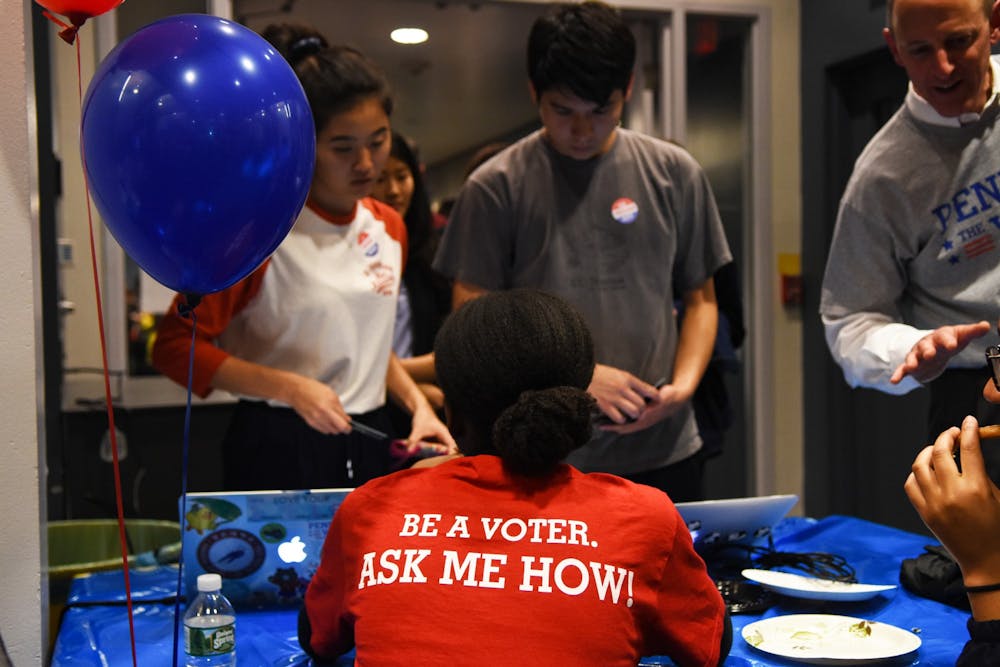
For the first time since 2016, most Penn students will be on campus during Pennsylvania's primary election in April. Penn Leads the Vote, a non-partisan group, plans to use this opportunity to increase student voter turnout, particularly among demographics and majors that traditionally vote less frequently.
This semester, PLTV will put most of its efforts into hosting voter registration drives and voter education tables for the presidential primary on April 28. The group is optimistic about this year's student voter turnout because on-campus voting in midterm elections has increased by more than 450% from 2014 to 2018.
According to 2019 College graduate and last year’s PLTV Director Benjamin Oh, Pennsylvania law mandates that the PA primaries for every local and midterm election take place in May except for the presidential primary. He said this means that most college students in the state have a reduced opportunity to vote in three out of every four Pennsylvania election cycles, since most are not on campus in May.
“This is the one primary in a four-year cycle where students will actually be on campus, and therefore they should be really excited to have the opportunity to vote,” PLTV co-Director and College sophomore Eva Gonzalez said.
PLTV, which operates under Penn’s Netter Center for Community Partnerships, is a non-partisan group founded in 2004. It aims to inform undergraduate and graduate students, as well as faculty and staff and the larger Philadelphia community, about the voting process and the importance of political participation in a democracy.
“At the end of the day, voter participation and voting shouldn’t be considered a partisan issue,” Oh said. “For us, it’s really important to emphasize that no matter what your political affiliation is or beliefs are, everyone deserves the opportunity to have their voice heard and an equal opportunity to go vote.”

PLTV will put most of its efforts into hosting voter registration drives and voter education tables this semester.
Last year, PLTV focused on voter outreach to underrepresented minorities. Oh said that the voter turnout greatly increased for Latinx and Asian-American students, and that Black women continue to be the most engaged voting group out of any college age group.
“We’re definitely still going to focus on those more underrepresented groups because obviously, if they are already more underrepresented they might not be registered, and we want to represent the entire Penn demographic,” Gonzalez said. “We want to serve the groups that I guess aren’t typically being served by other institutions.”
During PLTV’s civic engagement week last year, the UA hosted a panel that emphasized the importance of participation in community civic engagement. UA President and College senior Natasha Menon said the panel featured diverse speakers, including people of color and women, to speak about why students should become politically engaged on campus.
According to Gonzalez, PLTV also plans to increase outreach efforts to different schools because students in Engineering and Wharton may be less politically engaged in comparison to students in the College.
In the 2018 midterm elections, Penn students studying in the fields of English, public administration, and visual arts saw the greatest increases in voter turnout. Since 2014, those studying computer science, mathematics, and architecture have the lowest voter engagement compared to students in other fields at Penn according to a report from the National Study of Learning, Voting, and Engagement.
PLTV is collaborating with Penn's Social Planning and Events Committee to host voter registration and get-out-the-vote activities for students during the days leading up to the Spring Fling concert and primary, which are both taking place in April. The group is also working with Campus Vote Project, a national organization that focuses on voter outreach efforts across college campuses, to host the Eastern Pennsylvania Summit voting conference for college students on Feb. 22.
PLTV not only wants students to vote in this year's presidential elections, but to make sure they are politically engaged in the long-term. The group has collaborated with grassroots community organizations in Philadelphia and on-campus, including the American Constitution Society, Penn’s 6B minority coalition, and the Government & Politics Association.
“We’re always here to provide resources, we have a voter packet and training webinar that we’re going to launch very soon,” PLTV co-Director and College sophomore Harrison Feinman said.
Oh said the group's overall goal is to help young people, especially those who might feel underrepresented in politics, believe that their voices can impact political decisions.
“We hope that they carry that [belief] not just in Penn but throughout their lives, because that’s how you make change and ensure that the future of democracy is better than the past,” Oh said.
The Daily Pennsylvanian is an independent, student-run newspaper. Please consider making a donation to support the coverage that shapes the University. Your generosity ensures a future of strong journalism at Penn.
Donate







